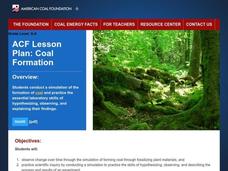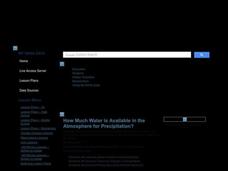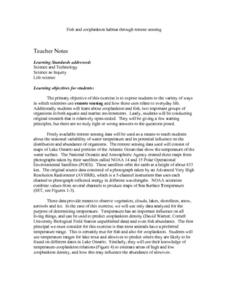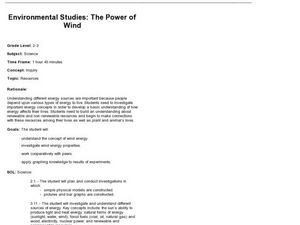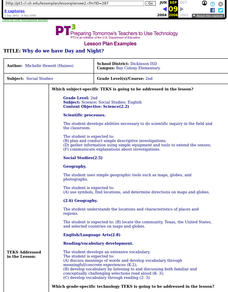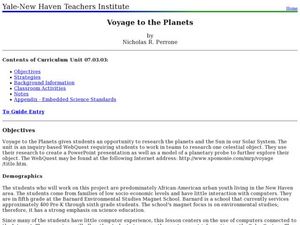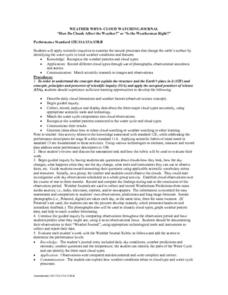University of Colorado
Can Photosynthesis Occur at Saturn?
In the 19th activity of 22, learners determine if distance from a light source affects photosynthesis. Participants capture oxygen in straws and find that the amount of water the gas displaces is proportional to the rate of photosynthesis.
Curated OER
Exploring Mars
Students, working in small groups construct scale models of the planets and solar system. They examine images of Mars and discuss what might have caused the features. They record facts about their planetary research in their journals and...
Curated OER
Coal Formation
Learners perform an in-depth study of coal - one of most important fossil fuels. Over a three-week period of time, they become familiar with how coal is formed underground, and will create a "fossil" right there in the classroom in order...
Curated OER
How Much Water is Available in the Atmosphere for Precipitation?
Students explore the relationship between the amount of water in the atmosphere available for precipitation and the actual precipitation observed by satellite. They examine seasonal changes in precipitation. They practice using Internet...
Curated OER
Sky Observations Sky & Cloud Windows
Students observe the sky and weather to gather data. They conduct experiments to answer questions about the sky and weather phenomena. They measure, analyze and present data. They create sky windows by gluing sky colored paint chips...
NASA
The Discovery of Jupiter Radio Waves
Lead your class on a journey to the planet Jupiter and provide them with fun facts in the process. Learners explore radio waves emitted by Jupiter to further understand how this data helps our daily lives. They conclude by discussing...
NASA
Exploring Data
Bring the sun to your class! Young scholars analyze actual solar wind data in the second lesson of a five-part series. Their analysis includes speed, temperature, and density data.
Curated OER
Fish and zooplankton habitat through remote sensing
Students are exposed to the variety of ways in which scientist use remote sensing and it used in everyday life. They investigate about zooplankton and fish. Students list the two important groups of organisms in both aquatic and marine...
Curated OER
Changing Planet: Fading Corals
Show the six-minute video, "Changing Planet: Fading Corals," and then demonstrate how calcium carbonate forms a precipitate in the presence of carbon dioxide. Separate your scientists into small groups to gather information about coral...
Pyro Innovations
Beach Exploration
Little ones will absolutely love this lesson. It's all about the beach and what they can find while sifting through the sand. A large bucket of sand filled with hidden items is brought into the classroom. Learners will discuss what kinds...
Curated OER
Lotto or Life: What Are the Chances?
Though the website does not seem to have the mentioned video, a reding and lottery style games simulate the chances of finding intelligent life somewhere other than Earth. Without the video, this activity is short, but it can be a useful...
Curated OER
LAND USE DEBATE / TOWN MEETING
Ninth graders research, analyze, and orally defend an issue related to the use of geologic resources. They defend their position in written form by composing a letter to an appropriate source.
Curated OER
Identifying Minerals
Learners compare and constrast a wide variety of minerals and rocks. They test them for streak, luster, color and other characteristics. They view an exhibit and compare their answers to them.
Curated OER
Environmental Studies: The Power of Wind
Investigate the prospect of wind as a renewable resource. Second and third graders make a pinwheel, answer critical thinking questions, and then attempt to use wind power to wind string. I would be more apt to use this lesson in a 1st or...
Curated OER
Zebrafish Development
Students examine the early development of zebrafish as a model for embryo development in humans. They observe various stages of zebrafish reproduction from sperm and eggs to fertilized eggs and hatchlings.
Curated OER
Dissolved Oxygen and Photosynthesis: 1
Young scholars are taught that plants produce oxygen underwater, and they design an experiment that test this question. They discuss whether plants give off oxygen, and how to measure this. Students measure the increase in dissolved...
Curated OER
The Nine Planets
Sixth graders examine and investigate the solar system. They participate in a Webquest, and create a Powerpoint presentation that is meant to be a research guide to help alien visitors find a suitable habitat in the solar system.
Curated OER
Why Do We Have Day And Night?
Second graders demonstrate knowledge and appropriate use of hardware components, software programs, and their connections. After a lecture/demo, student groups utilize raisins and apples to demonstrate day and night. They put togethre a...
Curated OER
Voyage to the Planets
Learners examine the planets in the solar system. In this planetatry lesson students complete a project using a WebQuest program.
Curated OER
World's Most Dynamic Force
Students explore the Earth's forces. They review an assessment task and its accompanying rubric. They classify ten items as long-term or short-term interactions of the Earth's components and rank the destructive impact of the forces. ...
Curated OER
Weather Whys- Cloud Watching Journal
Students examine how natural processes change the earth by identifying their local water cycle. Individual students complete a cloud journal over a specific period of time. They observe clouds daily and take photographs of the clouds...
Curated OER
Mars Calendar Project
Students design a calendar that displays time on Mars. They explore the differences between time on Earth and time on Mars while making the calendar.
Curated OER
Is the Hudson River Too Salty to Drink?
Students explore reasons for varied salinity in bodies of water. For this geographical inquiry lesson, students use a variety of visual and written information including maps, data tables, and graphs, to form a hypothesis as to why the...
Curated OER
The Phantom of the Computer Lab
Students calculate the power consumption of computers in school. In this physics lesson, students design an experiment to determine whether the school should unplug computers at the end of the day. They collect data and report findings...
Other popular searches
- Earth Science Inquiry Rocks
- Earth Science Inquiry Water
- Earth Science Inquiry Maps
- Earth Science Inquiry Soil
- Inquiry Earth Space Science
- Inquiry and Earth Science
- Inquiry & Earth Science




